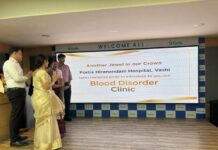· Pre-implantation Genetic Diagnosis is a procedure used prior to implantation to help identify genetic defects within embryos
· According to World Health Organization (WHO) around 1.1% of couples worldwide are at risk for having children with a hemoglobin disorder
New Delhi, March 29, 2019: Doctors at leading fertility hospital Fortis Bloom IVF Centre, Fortis La Femme, New Delhi have successfully used the procedure of preimplantation genetic diagnosis (PGD) to help a couple with thalassemia deliver a healthy baby. The procedure that involves artificial fertilization and helps identify genetic defects within embryos offers immense hope for couples living with genetic disorders.
When the parents of newborn Khushi (name changed) decided to conceive, they were anxious and worried about the possibility of passing the blood disorder to their child. Both mother and father are carriers of thalassemia, a potentially life threatening blood disorder that is transmitted genetically. This is when they decided to seek the help of fertility experts at Fortis Bloom IVF Centre.
“Beta thalassemia and sickle cell disorders are a significant health burden in India. The average prevalence of Beta thalassemia in Indian population is around 3.5%. Similarly, sickle cell disorder which is a single gene disorder is more prevalent in the central belt of India, states such as Maharashtra, Madhya Pradesh, Chhattisgarh and Orissa. For parents who are carriers of thalassemia, the probability of passing on this disorder to their child is quite high. This is why pre-conception counseling and diagnosis is very important. The couple in this successful case, were understandably anxious before conceiving. However, we used the new age advanced method of pre-implantation genetic diagnosis to prevent the genetic disorder from being passed on to their child. The child is now 2 months old and perfectly healthy,” said Dr Hrishikesh Pai, Gynaecologist and Infertility Specialist – Fortis Bloom IVF Centre, Fortis La Femme, GK-2, New Delhi.
The embryos used in PGD are created artificially through in vitro fertilization (IVF) that
includes egg retrieval and fertilization in a laboratory. When the embryos are about 5 days developed, a few cells are microscopically collected from them and a DNA analysis is conducted to determine if a problematic gene has been inherited by the embryos. Once healthy embryos have been identified, they are placed in the uterus for the pregnancy to take its normal course. Over 100 genetically transmitted diseases/disorders can be tested prior to implantation using this procedure.
“The condition of inherited haemoglobin disorders in fetuses is prevalent in West Bengal. The only way to prevent babies from inheriting such conditions is by raising awareness among the population, screening for identification of carriers, genetic counseling and pre-natal diagnosis. In cases where both parents are carriers of a blood disorder, PGD must be conducted to identify the threat to the baby and select healthy embryos for pregnancy. A healthy child is born. It is important to educate people and reducing possibilities of them transmitting genetic disorders in their children,” said Dr Nandita Palshetkar, Gynaecologist and Infertility Specialist – Fortis Bloom IVF Centre, Fortis La Femme, GK-2, New Delhi
Thalassemia is an inherited blood disorder in which the body makes an abnormal form of hemoglobin resulting in excessive destruction of red blood cells, which leads to anemia. There are different types of thalassemia – some of them are easily manageable while others more serious. Thalassemia creates multiple compilations such as iron overload which results in damage of heart liver and endocrine system, bone deformities which can lead to bone marrow expansion. This can result in abnormal bone structure, especially in your face and skull. Bone marrow expansion also makes bones thin and brittle, increasing the chances of fracture. Heart problems such as congestive heart failure and abnormal heart rhythms (arrhythmias) may be associated with severe thalassemia.
It is necessary to educate health professionals, school and college students, pregnant women and the population at large and instill a culture of pre conception counseling among parents to increase their chances of conceiving healthy babies.
Corporate Comm India(CCI Newswire)























